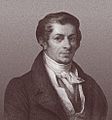Austrian School facts for kids
The Austrian School is a way of thinking about how money and goods work. It focuses on the choices and actions of individual people. This school of thought began in the late 1800s and early 1900s in Vienna, Austria. It's called "Austrian economics" because many of its first thinkers were from Austria. Today, people who follow these ideas live all over the world.
People who follow the Austrian School believe that governments should not control the economy too much. They think that things like setting prices or telling businesses what to make don't work well. This is because millions of people making their own choices know more than any government group. They also don't like when governments print too much money, which can make prices go up.
Some other economists today don't agree with the Austrian School. They often criticize it because it doesn't use a lot of math or statistics in its ideas.
Contents
Who Are the Key Thinkers of the Austrian School?
The Austrian School has been shaped by many important economists. These thinkers helped develop the ideas about individual choice and free markets.
Founders and Early Influencers
Later Leaders and Modern Thinkers
- Ludwig von Mises
- Friedrich Hayek
- Murray Rothbard
- Israel Kirzner
- Yuri Maltsev
Images for kids
-
Jean-Baptiste Say. The French Liberal School of Political Economy is an intellectual ancestor of Austrian School of Economics.
-
Campus of Mises Institute, in Auburn, Alabama
See also
 In Spanish: Escuela austriaca para niños
In Spanish: Escuela austriaca para niños
 | Emma Amos |
 | Edward Mitchell Bannister |
 | Larry D. Alexander |
 | Ernie Barnes |








